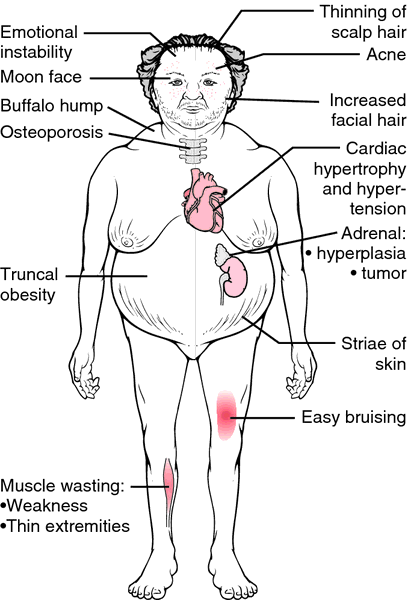What is Cushing's Syndrome?
Cushing's Syndrome is a collection of symptoms that develop when the body is exposed to excessive levels of the hormone, cortisol, for a prolonged period of time ( >1.4 micrograms per litre of blood). Extremely rare, with only about 13 cases for every million people, Cushing's Syndrome can afflict animals too, such as dogs and horses. | |||||
| A bulldog with Cushing's Disease having swollen enormously, a hallmark of the disorder. |
What is cortisol (the "stress hormone")?
 | |
| Chemical structure of cortisol |
Cortisol is a steroid hormone our body makes during times of psychological and physical stress, including exercising and fasting. It affects nearly every tissue and organ. Through gluconeogenesis and glycogenolysis, cortisol's chief function is to unleash a steady supply of glucose to help our bodies cope with whatever emergency or stressful situation at hand, thus earning the moniker, "fight-or-flight".
Biochemistry
Gluconeogenesis
In gluconeogenesis, new glucose is synthesised in the liver (and kidneys, but rarely) from non-carbohydrate sources such as glucogenic amino acids (especially Alanine and Glutamine), lactates and glycerol.Cortisol supports gluconeogenesis in a number of ways:
1) Stimulating the expression of key enzymes of gluconeogenesis
Being a non-polar steroidal hormone, cortisol is able to pass through the hydrophobic cell membrane of liver cells and bind onto glucocorticoid receptors (GR) inside the cytoplasm. The GR changes conformation and becomes activated. Together, the cortisol-GR complex moves into the nucleus, and bind onto GR elements (enhancers) along the DNA molecule to upregulate transcription and hence, expression of genes encoding enzymes of the gluconeogenesis pathway, principally:
Pyruvate carboxylase (pyruvate + ATP ---------> oxaloacetate + ADP)
Phosphoenolpyruvate carboxykinase (oxaloacetate + GTP ----> phosphoenolpyruvate + GDP + CO2)
Glucose-6-phosphatase (glucose-6-phosphate -------> inorganic phosphate + free glucose)
***Note that these enzymes catalyse the non-reversible reactions of glycolysis and are thus instrumental for gluconeogenesis to proceed.
 |
| Steroid hormones like cortisol act as primary messengers to alter celullar activities. |
2) Breakdown of muscle/tissue proteins to provide amino acid substrates
3) Breakdown of adipose tissue (fats) into fatty acids and glycerol substrates
 | |
| Gluconeogenesis. Amino acids, lactates and glycerol enter at different points but are eventually converted to glucose. |
 | |
| How lactate is recycled back into glucose. |
Glycogenolysis
Cortisol also promotes glycogenolysis, in which stored glycogen in the liver and muscles is converted back into free glucose and glucose-6-phosphate, by facilitating the activation of a key enzyme, glycogen phosphorylase. |
| Glycogenolysis |
Cortisol also runs counter to another hormone, insulin, by restricting the amount of glucose non-muscle tissues can take up (by preventing the translocation of glucose transporter proteins to the cell membranes).
Feasting on glucose
As a result, the brain and the muscles now have a great supply of glucose at their disposal: through cellular respiration, glucose provides crucial energy for vigorous muscular contractions so that we can perhaps run faster to catch a leaving bus, or flee from a rampaging animal. Cognitive performance improves - we can now think and react much more quickly to save our own necks. ;)Regulation of cortisol production
Cortisol is produced by the adrenal glands on top of each kidney but its production is regulated by the hypothalamus in the brain.When we experience stress, the hypothalamus releases corticotropin-releasing hormones (CRH) that stimulate the anterior pituitary gland (APG) to release adrenocorticotropic hormones (ACTH). ACTH in turn prompt the adrenal cortex to release cortisol.
When there is excessive cortisol, signals are sent back to the hypothalamus to wind down production of CRH. Accordingly, less ACTH will be released and thus less cortisol is produced, eventually stopping. This is known as the negative feedback loop of cortisol.
 | |
| Cortisol production and negative feedback |
What are the symptoms of Cushing's Syndrome?
- Rapid weight gain around central body trunk (face, stomach, chest)
- round, puffy face ("moon face")
- arms and legs remain relatively slender
- "Buffalo hump" (fat deposits at back of shoulders and neck)
- Thin skins that bruises easily
- Reddish-purple stretch marks (striae) on buttocks, thighs, stomach
- Oedema (swelling) around ankles
- Perpetual thirst
- Muscle weakness and osteoporosis
- Diabetes
- High blood pressure (hypertension)
- Mood swings, irritable, anxiety
- Growth and thickening of facial/body hair in women (hirsutism)
- Prone to illnesses/infections
- Disturbances in mentrual cycle (women); infertility (men)
 |
| "Moon face" with facial redness ("plethora") |
 |
| General symptoms of Cushing's Syndrome |
 |
| Striae (stretch marks) |
Behind the scenes: Pathophysiology comes in play
Why is there:Rapid weight gain
- Cortisol displaces fats from beneath the skin (subcutaneous) to the main organs of the central body trunk (visceral). This is so that the fats can be quickly broken down into glycerol and delivered to the liver for gluconeogenesis, since such organs are more vascularised than the skin.
- Cortisol deprives non-muscle tissues of glucose and so hunger signals are sent to the brain by starving cells. We gobble up much more food than we need and excess carbohydrates are stored as fats.
 |
| Weight gain around the central body trunk |
Striae and muscle weakness
The body gathers enough amino acids for gluconeogenesis by degrading proteins from the muscles and other tissue, as well as by impairing both amino acid uptake into the muscles and protein synthesis. Muscles lose mass and weaken, and the skin becomes fragile. As visceral fats continue to deposit, thin skin easily overstretches and blood vessels rupture, creating striae.
Susceptibility to illnesses/infections ; disturbances in reproductive system
Cortisol also shuts down activities non-essential to our "immediate survival", such as the immune and reproductive systems, so as to divert precious resources to the brain and muscles instead. Inflammatory responses, our body's defence mechanism against infections, are stifled while antibodies are made poorly and insufficiently.The patient's immune system becomes so weak he might be no different from a person with AIDS - tuberculosis, fungal and opportunistic infections, etc.
Thankfully however, the immune system can go back to normal once Cushing's Syndrome is being treated.
 |
| Inflammation is largely subdued |
Hypertension (high blood pressure)
Cortisol enhances arterioles' sensitivity to epinephrine, the hormone that makes blood vessels constrict (vasoconstriction) to divert more blood to the brain and muscles. The heart also pumps faster to hasten delivery of glucose- and oxygen-rich blood to these regions.
What cause Cushing's Syndrome?
Excess cortisol comes either from external (exogenous) or internal (endogenous) sources.Exogenous (external)
Long-term corticosteroid medication leads to a build-up of cortisol and accounts for over 90% of Cushing Syndrome cases. Corticosteroid drugs are essentially synthetic cortisol. They are anti-inflammatory, providing patients with lupus, rheumatoid arthritis, organ transplants, atopic eczema and the likes much-needed relief.
 |
| Prednisone, hydrocortisone and dexamethasone are corticosteroid drugs |
Endogenous (internal)
The body produces excessive cortisol due to other medical complications:
1) Pituitary adenoma
This is a small,benign (non-cancerous) tumour of the pituitary gland that secretes excessive ACTH. To make matters worse, this tumour is not governed by the negative feedback loop controlling cortisol production. Cushing's Syndrome specifically from this cause is termed Cushing's Disease.
2) Adrenal problems
- Adrenal hyperplasia
- Tumours of the adrenal glands
3) Ectopic ACTH
Certain tumours originating outside the pituitary gland ("ectopic") begin producing ACTH of their own accord, leading to excessive ACTH which eventually overstimulate cortisol production. Some rare forms of lung cancer have this effect.
 |
| 18-month-old Aditya Kumar of India suffers from Cushing's Syndrome.Facial and body hair develop much sooner than they should. |

Under the section on susceptibility to infections/illnesses due to the shutting down of non-essential activities, do the lymphatic systems that suffer from chronic disuse return to their normal state once Cushing's syndrome is controlled? Or are they permanently damaged with no chance of recovery?
ReplyDeleteHi Kang Ming! :)
ReplyDeleteThe immune system actually CAN recover once Cushing's syndrome is under control. It's just that too much cortisol can suppress the immune system to the point that the patient may come down with all sorts of infections and illnesses common in people with AIDS. However thankfully, this suppression is not permanent.
Thanks for the question! I learnt something new myself too :)
Sorry for the confusion and thank you for visiting! :)
Am I right to say that cortisol functions the same way as adrenaline in gluconeogenesis?
ReplyDeleteHey Kenneth :)
ReplyDeleteYes you can say that. :)
Thanks for visiting!
Wei Lu
Thanks for the reply!
ReplyDelete-kangming
Hi.
ReplyDeleteIs exercising recommended for patients with Cushing's Syndrome? (to metabolise the fats and gain muscle strength)
Do they have to make changes to their diet as well? (eat less)
Please correct the part where you state"gobble up too much food". Wrong on many levels. Yes, excess steroids make you hungary but I can tell you categorically as the years pass by and the weight gain won't stop, you do not start gobbling up extra food.
ReplyDeleteThey took ten years to dx me. Too many drs and endos to count.
The last six years before dx I hardly ate and ended up with severe vitamin deficiencies.
Your page and info is one of the best descriptions I've ever come across, but seeing as this will remain on-line forever it must be corrected.
Cushings is cruel, its wrecked my life, cost me my career and now left me with permanent adrenal insufficiency.
people have never heard of cushings, they think you are lying and over eating and a lazy slob.
the reality is, you have had your body destroyed whilst starving yourself in complete desperation to make it stop.
every one with this horrible illness around the world would be devastated that after every accusation from drs not beieving your'e ill, combined with the number of years it takes to diagnose, we are still being accused of bringing the weight gain on ourselves....wow...staggering!!!!
Excess steroid causes weight gain in cushings, it makes zero difference whether you eat or not. Nothing stops it.
Cushings kills through late diagnosis, mainly because we are looking the same as lazy overeaters....big difference is, we are not overeating.
I have suffered years of nasty comments, people staring etc.
Cushings takes away everything, your self esteem, confidence, your dreams and plans. It's much much more than scientific facts alone.